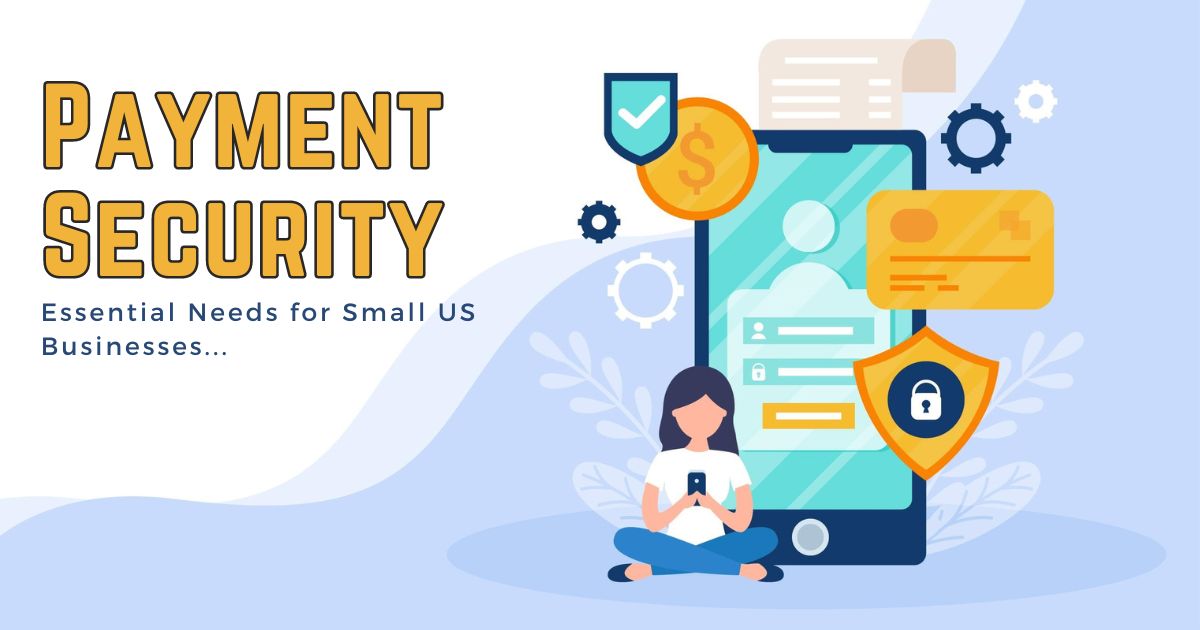
| August 13th, 2024 |
Essential Payment Security Needs for Small US Businesses!
In the fast-changing digital landscape, small businesses in the United States are becoming increasingly reliant on payment processing solutions to manage transactions and expand their operations. However, as digital payments become more prevalent, there is a greater need for stronger security measures to protect sensitive financial data from cyber threats. Understanding the expected payment security requirements in payment processing is critical for small businesses to protect their consumers and reputation.
1. PCI DSS Compliance: A Must-Have —
One of the most important security regulations that small businesses must follow is the Payment Card Industry Data Security Standard (PCI DSS). PCI DSS is a collection of security standards intended to ensure that all businesses that process, store, or transport credit card information operate in a secure environment. Compliance with PCI DSS is a mandate for small enterprises, not a recommended. Noncompliance can result in high fines and an increased risk of data breaches.
Key PCI DSS requirements include:
- Installing and maintaining a firewall: This helps protect cardholder data from unauthorized access.
- Encrypting transmission of cardholder data: Sensitive information should be encrypted when sent across open or public networks.
- Regularly updating antivirus software: This protects systems against malicious software that could compromise payment data.
2. Tokenization and Encryption: Safeguarding Data —
As small businesses handle more digital payments, they must anticipate the need for advanced data protection techniques like tokenization and encryption.
- Tokenization: This process replaces sensitive card information with a unique identifier or token. The token is meaningless to hackers, reducing the risk of data theft during transactions.
- Encryption: Encrypting payment data ensures that even if data is intercepted, it cannot be read or used by unauthorized individuals. End-to-end encryption (E2EE) is particularly important as it encrypts data throughout the entire transaction process, from the point of sale to the payment processor.
These technologies are becoming standard in the payment processing industry and will likely be anticipated requirements for small businesses to adopt in the near future.
3. Two-Factor Authentication: Enhancing Account Security —
Two-factor authentication (2FA) secures the payment process by asking users to authenticate their identity using a second method, such as a text message code or a biometric scan, in addition to their password. Implementing 2FA in small organizations can dramatically reduce the risk of unauthorized access to payment systems.
Customers are increasingly expecting businesses to provide secure payment choices, and 2FA is one step in that direction. Small businesses should see this as a critical security requirement in order to maintain confidence and ensure secure transactions.
4. Address Verification System (AVS) and Card Verification Value (CVV): Fraud Prevention Tools —
Fraud prevention is a significant need for small businesses, particularly as online and card-not-present (CNP) transactions become more prevalent. The Address Verification System (AVS) and Card Verification Value (CVV) are critical instruments for preventing payment fraud.
- AVS: This system checks the billing address provided by the customer against the address on file with the card issuer. A mismatch can indicate potential fraud and trigger additional verification steps.
- CVV: The CVV code, typically found on the back of a credit or debit card, is an extra layer of security to ensure that the person making the purchase physically possesses the card.
Incorporating AVS and CVV checks into payment processing can help small businesses reduce the risk of fraudulent transactions and chargebacks, protecting both their revenue and their reputation.
5. Monitoring and Alerts: Staying Vigilant Against Threats —
Small firms must plan for robust monitoring systems that deliver real-time notifications for questionable activity. Continuous monitoring of payment systems enables firms to notice and respond to any security breaches rapidly.
Key features to look for in a monitoring system include:
- Transaction monitoring: Identifies unusual spending patterns that could indicate fraud.
- Account activity alerts: Notifies business owners of login attempts, password changes, or other account activities that could suggest unauthorized access.
- Automated fraud detection: Utilizes machine learning algorithms to detect and block fraudulent transactions before they are processed.
By staying vigilant and using these monitoring tools, small businesses can prevent security breaches and protect their customers’ data.
6. Compliance with Data Privacy Regulations: Protecting Customer Information —
With the increased emphasis on data privacy, small businesses in the United States must be aware of and comply with applicable rules. The California Consumer Privacy Act (CCPA) and the General Data Protection Regulation (GDPR) are two major legislations governing how businesses handle customer data.
- CCPA: Although it primarily applies to larger businesses, small businesses that handle large volumes of personal data or share data with third parties may also need to comply. The CCPA gives consumers the right to know what data is being collected about them and to request its deletion.
- GDPR: Although a European regulation, GDPR can affect US-based businesses that deal with European customers. GDPR requires businesses to obtain explicit consent before collecting personal data and to provide customers with the ability to access, correct, or delete their data.
Anticipating compliance with these regulations ensures that small businesses can avoid fines and maintain customer trust.
7. Regular Security Audits and Employee Training: Building a Secure Culture —
Security is not a one-time effort, but rather an ongoing process. Small businesses should prepare for frequent security audits to discover and repair vulnerabilities in their payment systems. These audits should be undertaken by qualified individuals who can provide recommendations to improve security measures.
In addition to audits, employee training is essential. Employees should be trained to spot phishing attempts, understand the importance of data security, and adhere to best practices when managing sensitive information.
Small firms that promote a security culture can lower the risk of data breaches caused by human error.
Conclusion —
Small businesses in the United States continue to rely on digital payment processing systems, therefore knowing and implementing security requirements is critical to protecting both their operations and their customers. Small firms may stay ahead of cyber risks and create customer trust by anticipating these security requirements, which include PCI DSS compliance, tokenization, 2FA, and regular security audits. In an increasingly scrutinized world of payment security, small businesses that prioritize security will be better positioned for long-term success.
